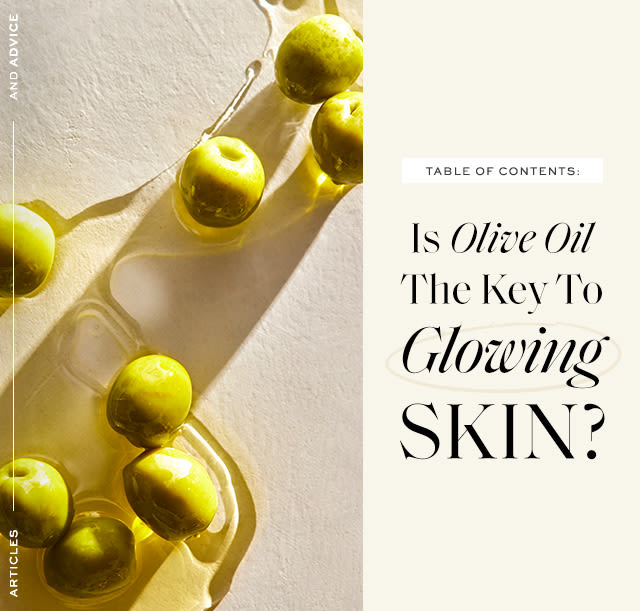
Your new skincare MVP.
By contributor, Ama Kwarteng.
Cooking with olive oil has its benefits — the Mediterranean Diet is one of the healthiest for a reason — but the kitchen staple has MVP status outside of the kitchen, too. Hippocrates called it “the great healer” and Homer “liquid gold.” Pharaohs massaged it into their bodies to soothe skin and it was a staple in Cleopatra’s beauty regimen. The first cold cream, concocted by Greek physician Galen in the 2nd Century A.D. was formulated with it. There's a reason olive oil has remained a popular beauty ingredient for thousands of years — it’s brimming with skincare benefits, from moisturizing dry patches to preventing fine lines and wrinkles.
Locks in Moisture:
Whether you’re using pure olive oil or it’s an ingredient in another product, it can help fight dryness and protect the skin barrier. Because olive oil is an emollient, it’s able to hydrate skin by providing a protective layer that seals maximum moisture into the skin, making it feel softer and look smoother. Most olive oils are also rich in essential fatty acids which are key compounds in the skin’s barrier and important for maintaining prime hydration levels. P.S. Be sure to use it as the last step of your skincare routine to make sure you’re getting all of the moisturizing benefits.
Protects Against Free Radical Damage:
All day long, your skin is blitzed by free radicals from UV rays, blue light, pollution, and stress. Free radicals damage skin cells which leads to inflammation and a dip in collagen and elastin levels. Thankfully, olive oil exists — it’s full of antioxidants that neutralize free radicals and protect skin cells from premature aging, irritation, redness, and more. Also, some research shows that because olive oil is high in antioxidants like vitamin E, it can help speed up wound healing and reduce the appearance of acne scars.
Lifts Makeup:
Olive oil is ideal for breaking down dirt, stubborn makeup, dead skin cells, and sebum buildup. Plus, its antioxidant-rich and hydrating formula gently moisturizes and nourishes skin. After you massage the olive oil into dry skin follow up with a cleanser to wash everything away.
Most skin types can benefit from olive oil, but if you’re struggling with sensitive, acne-prone skin, you should probably steer clear. If your skin is a candidate for olive oil, consider adding one of the products, below, to your skincare routine. If it’s good enough for Cleopatra, it’s good enough for you.
Cooking with olive oil has its benefits — the Mediterranean Diet is one of the healthiest for a reason — but the kitchen staple has MVP status outside of the kitchen, too. Hippocrates called it “the great healer” and Homer “liquid gold.” Pharaohs massaged it into their bodies to soothe skin and it was a staple in Cleopatra’s beauty regimen. The first cold cream, concocted by Greek physician Galen in the 2nd Century A.D. was formulated with it. There's a reason olive oil has remained a popular beauty ingredient for thousands of years — it’s brimming with skincare benefits, from moisturizing dry patches to preventing fine lines and wrinkles.
Locks in Moisture:
Whether you’re using pure olive oil or it’s an ingredient in another product, it can help fight dryness and protect the skin barrier. Because olive oil is an emollient, it’s able to hydrate skin by providing a protective layer that seals maximum moisture into the skin, making it feel softer and look smoother. Most olive oils are also rich in essential fatty acids which are key compounds in the skin’s barrier and important for maintaining prime hydration levels. P.S. Be sure to use it as the last step of your skincare routine to make sure you’re getting all of the moisturizing benefits.
Protects Against Free Radical Damage:
All day long, your skin is blitzed by free radicals from UV rays, blue light, pollution, and stress. Free radicals damage skin cells which leads to inflammation and a dip in collagen and elastin levels. Thankfully, olive oil exists — it’s full of antioxidants that neutralize free radicals and protect skin cells from premature aging, irritation, redness, and more. Also, some research shows that because olive oil is high in antioxidants like vitamin E, it can help speed up wound healing and reduce the appearance of acne scars.
Lifts Makeup:
Olive oil is ideal for breaking down dirt, stubborn makeup, dead skin cells, and sebum buildup. Plus, its antioxidant-rich and hydrating formula gently moisturizes and nourishes skin. After you massage the olive oil into dry skin follow up with a cleanser to wash everything away.
Most skin types can benefit from olive oil, but if you’re struggling with sensitive, acne-prone skin, you should probably steer clear. If your skin is a candidate for olive oil, consider adding one of the products, below, to your skincare routine. If it’s good enough for Cleopatra, it’s good enough for you.